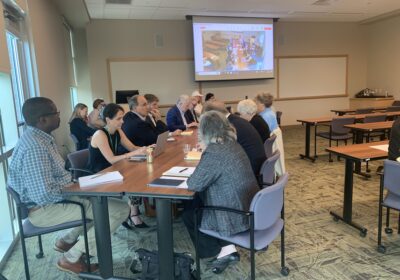Candidates come to campus for debate
In what moderator Brian Williams called the “critical stage” of the campaign season, the four remaining Republican candidates took stage at USF on Monday night in the latest national debate.
The candidates wasted no time before trading blows with each other in Theatre 1. Williams opened the debate asking Gingrich for his response to Romney’scomments from Monday morning calling him “erratic” and a “failed leader,” which led to an extended sparring between the two candidates.
Romney quickly pointed out Gingrich’s gains from Freddie Mac, a company that illegally profited from the collapse of the subprime housing bubble.
“I don’t think we can possibly retake the White House if the head chief is taking money from Freddie Mac,” Romney said. “The Speaker Gingrich took the money directly, at the same time Freddie Mac was costing the citizens of Florida millions of dollars.”
Gingrich was quick to rebound, defending his $300,000 Freddie Mac role as a consultant and calling Romney’s goal of a low 15 percent tax rate for all Americans the “Mitt Romney flat tax.”
“He got all this stuff jumbled up,” Gingrich said. “The only thing we did wrong was one lawyer wrote a letter in error.”
Romney said he had no apologies for his tax returns, which he is expected to release publicly today, but rather more barbs for Gingrich.
“I will not apologize for having been successful,” he said. “What I was able to build, I earned the old-fashioned way – by working hard. I’m not going to apologize for success or free enterprise. You (Gingrich) made millions while the people of Florida were hurting.”
Gingrich eventually paused after a flurry of Romney’s rhetoric, appearing slightly befuddled.
“Let me be clear,” he said. “You used this routine on McCain. You used this routine on Huckabee. You’ve been walking around this state saying things that are untrue.”
After Williams interrupted the two with a commercial break, Rick Santorum and Ron Paul jumped in with their own points.
“We’re looking for someone who will make (President Barack Obama) the issue in this race, not the Republican candidates,” Santorum said.
Yet Santorum was quick to attack both Romney and Gingrich.
“My only question with Gov. Romney and Speaker Gingrich is … if you believe in capitalism that much, why did you support the bailout of Wall Street?” he said. “You should have allowed those financial institutions to go through the bankruptcy process and you would have seen these companies fail and pay the price.”
Meanwhile, Paul said he was not considering running as a third-party candidate if he did not win the Republican nomination.
The candidates were grilled on their views on an issue close to the heart of Floridians: The burst of the housing bubble. Williams said in Tampa alone, 53 percent of houses are worth less than they were before the housing bubble collapse.
Santorum said he blamed Fannie May and Freddie Mac and pledged to “help people get out from the houses they’re being held under.”
Paul said the crisis was easily avoidable.
“The whole bubble was easily seen,” he said. “The consequences were anticipated. Our policies in Washington still have been to … keep prices up. A lot of people made a lot of money on that. The bad debt was dumped on the taxpayers.”
Romney and Gingrich were quick to pile onto the Dodd-Frank Act to regulate housing finances signed into law by Obama.
“The fact is Dodd-Frank has let the biggest banks get bigger,” Gingrich said. “Crippling small businesses. If they would repeal it tomorrow morning, you’d have a better housing market overnight. It’s an invitation to corruption.”
The discussion later switched to the policy of imposing sanctions on Cuba, where Paul stood apart from his Republican colleagues.
“I don’t like the isolationism of not talking to people,” he said. “The Cold War is over. We propped up (Fidel) Castro for 40-some years, and he could always use us as a scapegoat. We talk to the Soviets, we talk to the Chinese. I don’t know why you get this assumption that all the Cubans are coming here. It’s not 1962 anymore.”
Santorum felt Paul’s policy would be a threat to Cuba’s closest neighbor – Florida.
“Sanctions should stay in place until the Castros are gone,” he said. “You’re right, Ron. It’s not 1962. Now Cubans are working with the jihadists, the Iranians, and they’re 90 miles off our borders.”
While other candidates spoke of a necessary war with Iran, Paul again differed from his running mates.
“We don’t have any money, we have too many wars, the people want to come home and the people don’t want another hot war,” he said. “That would be the most foolish idea.”
All four candidates did agree, however, on making English the national language while still supporting the country’s diversty.
“The challenge of the United States is very simple,” Gingrich said. “How do you unify the country? What is the common bond? Campaigning, historically, you go to people on their terms in their culture. I’m perfectly happy to have a lot of support in the Hispanic community, but as a country I think it’s essential that we have a central language that we are all able to communicate in.”
When the candidates spoke of their solutions to deal with illegal immigration, Romney said he believed the answer was “self-deportation.”
“We’re not going to round people up,” he said. “People will be given a transition period – they could stay or leave but they would no longer have the documentation to legally work.”
Santorum said he believes self-deportation is in fact happening.
“People are going back now because they can’t find jobs,” he said. “But we should enforce the law. You come to this country and the first thing you do is respect our laws.”
The common antagonist of the night, however, remained Obama.
“This president has failed the people of Florida miserably,” Santorum said. “He plays 90 rounds of golf when we have millions of people out of jobs.”
J. Edwin Benton, a USF political science professor, said he thought Romney may have made somewhat of a rebound after losing in the South Carolina primary.
“I think I would give Romney a slight edge because he scored points with Freddie Mac, tying Gingrich to special interests,” he said. “I think he made some inroads in the right direction.”
Overall, Benton said the debate was more cordial than he expected.
“I really thought it was going to be a knockdown-dragout where the candidates takes the gloves off and have a catfight,” he said. “I think the candidates expected that, but the way the questions were canned or prepared by the media, steered them away from that kind of conflict.”
The state will vote on a candidate Jan. 31 during the Florida primary.






